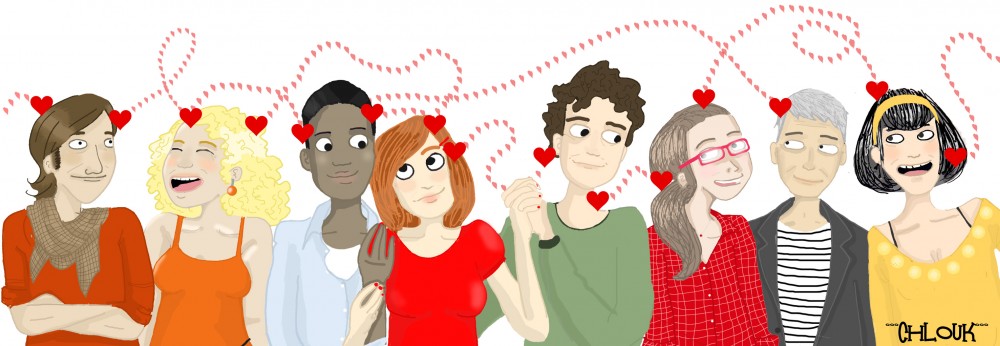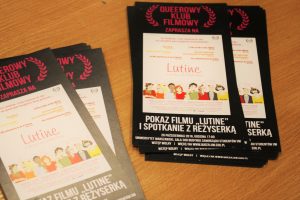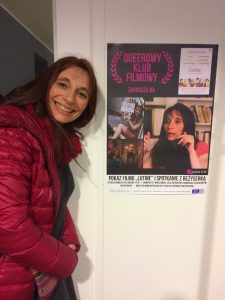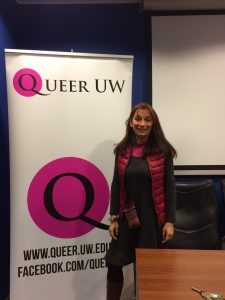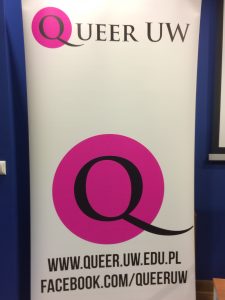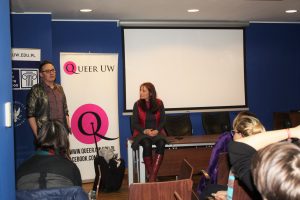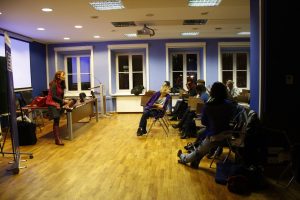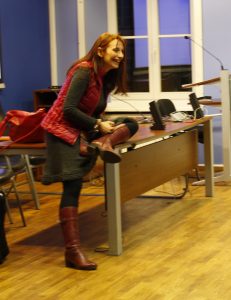Reżyserka kręci film dokumentalny o poliamorii: gdzieś pomiędzy rzeczywistością a fikcją, podejmuje ryzyko i nie zawsze może przewidzieć konsekwencje… Czy jej ukochany będzie w stanie sprostać wyzwaniom poliamorii? Czy uda jej się dokończyć swój film? Odpowiedzi znajdziesz… pomagająć jej sfinansować projekt!
LUTINE was screened in Warszawa on October 26th, 2016.
Événement Facebook
Foundation StudioSprawKobiet / Page Facebook
See the description of the event below.
The screening was organized by Queer UW…
… and followed by a discussion with the audience!
With my friend Justyna Sempruch who had seen LUTINE in Lisbon at the Non Monogamy and Contemporary Intimacies Conference in September 2015 and organized the whole event with the Queer UW and made my trip to Warsaw possible with her foundation: thank you Justyna! And thanks to Emilia Gadja, who’s helped you a lot.
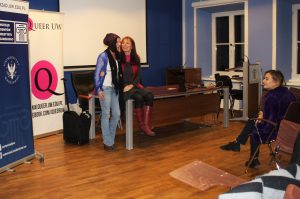
Then we enjoyed Warsaw by night!
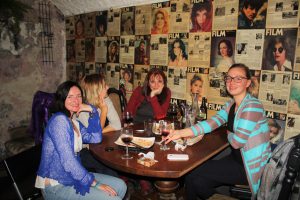
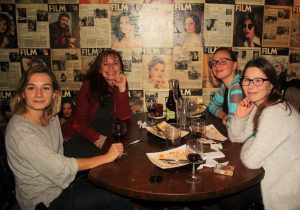
And these are the only touristic views I got from Warsaw that night!
Warsaw University where the screening took place: a fantastic site, it seems to be!
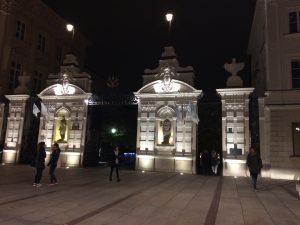
And the Palace of Culture, a souvenir from Stalin!
Here is the description of the event:
(ENGLISH FOLLOWS)
Więcej: http://queer.uw.edu.pl/
Poliamoria bez tajemnic. Ale i z przymrużeniem oka. Reżyserka kręci film dokumentalny o poliamorii: gdzieś pomiędzy rzeczywistością a fikcją, podejmuje ryzyko i nie zawsze może przewidzieć konsekwencje… Czy jej ukochany będzie w stanie sprostać wyzwaniom poliamorii? Czy uda jej się dokończyć swój film?
Poliamoria to termin, który pochodzi od greckiego poli (wiele) i łacińskiego amor (miłość), stąd przyjęło się dosłowne określanie poliamorii jako miłość mnoga lub wielomiłość. Według oficjalnej definicji poliamoria to związek miłosny z więcej niż jedną osobą w tym samym czasie. Skąd wzięła się potrzeba tworzenia tego typu związków? Jak przekonują poliamoryści, wielomiłość to wyzwolenie spod presji jaką jest monogamia, czyli narzuconych norm, które, zdaniem poliamorystów, odbierają wolność wyboru i swobodę decydowania, nie dając w zamian szczęścia.
Wiele osób twierdzi, że poliamoria nie jest nowym zjawiskiem, lecz powrotem do korzeni. W dawnych kulturach plemiennych tworzenie podobnych związków było podstawą funkcjonowania. W różnych kulturach zawsze były związki, w których występował więcej niż jeden partner (na przykład w latach 70. XX w. w komunach żyły grupy dzieci « kwiatów » – wspólnoty, które uważały się za rodziny). Właśnie dlatego, że poliamoria jest powrotem do prymitywnej formy życia, która nie była regulowana zasadami kultury czy prawa, u niektórych może budzić lęk.
Naszym gościem po projekcji filmu będzie twórczyni i bohaterka filmu Isabelle Broué. Autorka odpowie na wszystkie pytania i opowie o procesie powstawania dziela. Naszymi gośćmi będą także dr Justyna Szachowicz-Sempruch (University of British Columbia) oraz Emilia Gajda z Fundacji Studio (S)praw Kobiet.
Wstęp na wydarzenie jest nieodpłatny.
Pokaz realizowany jest w ramach cyklu Queerowy Klub Filmowy.
Wydarzenie dofinansowano z budżetu Samorządu Studentów UW.
— ENGLISH —
Polyamory without secrets, but also with a pinch of salt. A director is making a document about polyamory: somewhere in between reality and fiction she takes a risk and cannot always foresee the consequences… Will her partner be able to face the challenges of polyamory? Will she be able to finish her movie?
Polyamory is a term which comes from the Greek poli (many) and Latin amor (love). According to the official definition, it is a romantic relationship with more than one person at the same time. Where does the need for such relationships come from? Polyamorous people argue that it is a liberation from the pressure of monogamy, meaning imposed norms which, according to them, take away the freedom of choice and decision without bringing happiness.
Many people claim that polyamory is not a new phenomenon, but rather a return to the roots. In past tribal cultures, similar relationships were the basis of existence. In various cultures there were always relationships with more than one partner (e.g. in the 70’s groups of “flower children” lived in communes and considered themselves families). Because polyamory is a return to a primitive lifestyle, unregulated by law or culture, it can be scary for some people.
We invited the creator and protagonist of the film, Isabelle Broué, to be our guest after the viewing. She will answer questions and talk about the process of making the movie. Dr Justyna Szachowicz-Sempruch (University of British Columbia) and Emilia Gajda (Fundacja Studio (S)praw Kobiet) will also be our guests.
The event is free.
The film viewing is part of the Queer Film Club.
Event co-financed by the Student Council of the University of Warsaw
